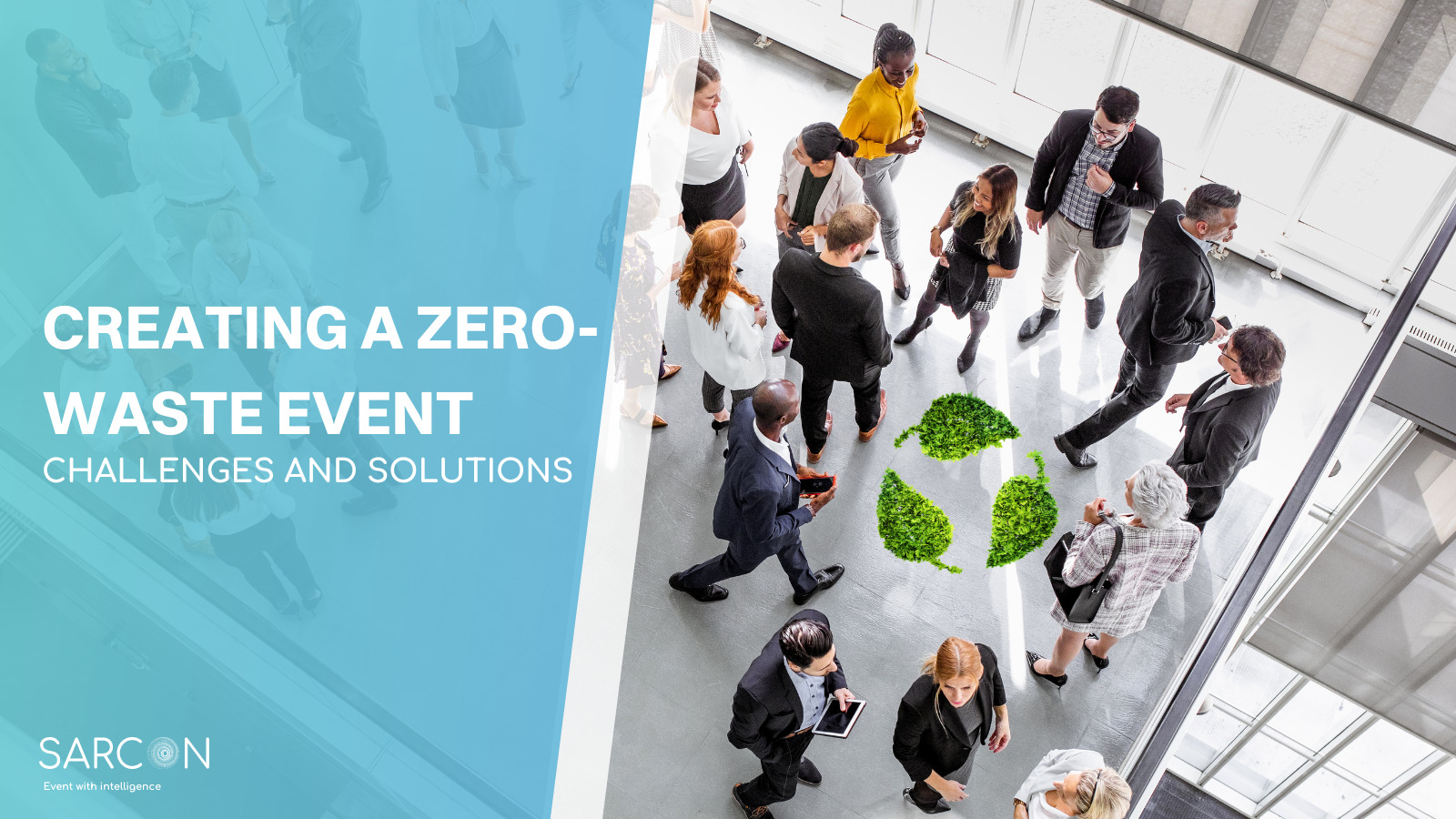Planning and organizing an event can be an exhilarating venture, accompanied by the responsibility to minimize its impact on the environment. In today’s world, where sustainability takes precedence, hosting a zero-waste event has become a significant objective for many event planners. In this article, we will delve into the challenges faced in creating a zero-waste event and provide practical solutions to help you achieve this crucial goal.
The Significance of Zero-Waste Events
Before delving into the challenges and solutions, let’s understand why zero-waste events hold importance. Traditional events generate a substantial amount of waste, including plastic bottles, food containers, and decorations. Unfortunately, this waste often finds its way into landfills or, even worse, our oceans, leading to environmental degradation and harm to wildlife.
By transitioning to zero-waste events, we can greatly reduce our ecological footprint. A zero-waste event aims to minimize waste generation and divert waste from landfills through recycling, composting, and other sustainable waste management practices. The goal is to ensure that little to no waste is sent to incinerators or disposed of in landfills, ultimately reducing the event’s environmental impact.
The Benefits of Creating Zero-Waste Events
Environmental Impact
Creating zero-waste events significantly mitigates environmental impact by minimizing waste sent to landfills, conserving resources, and reducing carbon emissions. These events contribute to a cleaner and healthier environment for present and future generations.
Cost Savings and Efficiency
Zero-waste events can lead to cost savings through reduced waste disposal fees and more efficient resource utilization. By implementing sustainable practices, event organizers can optimize procurement processes, minimize unnecessary expenses, and enhance overall event efficiency.
Positive Public Image and Reputation
Organizing zero-waste events demonstrates a commitment to sustainability and environmental stewardship. This can enhance an organization’s public image, attract eco-conscious attendees and sponsors, and differentiate it from competitors. Positive media coverage and word-of-mouth promotion further contribute to a strong reputation.
Challenges in Creating Zero-Waste Events
Waste Management and Disposal
One of the primary challenges in creating zero-waste events is effectively managing and disposing of waste. Traditional events often generate vast amounts of single-use plastics, food waste, and other materials that end up in landfills. To overcome this challenge, event organizers need to implement comprehensive waste management systems that prioritize recycling, composting, and waste reduction.
Sustainable Sourcing and Procurement
Another significant challenge is sourcing and procuring sustainable materials for event infrastructure, decorations, and promotional items. Event organizers must consider the lifecycle of the products they use, opting for environmentally friendly and ethically sourced alternatives. This requires close collaboration with suppliers who share the same commitment to sustainability.
Transportation and Logistics
Transportation contributes significantly to the carbon footprint of large-scale events. Participants travel from different locations, often resulting in high emissions. Event organizers can address this challenge by encouraging carpooling, promoting public transportation, and providing shuttle services using low-emission vehicles. Additionally, optimizing logistics can reduce the overall environmental impact by minimizing unnecessary transport and ensuring efficient resource utilization.
Behavior Change and Participant Engagement
Changing participant behavior and fostering engagement with sustainability practices can be a significant hurdle in creating zero-waste events. People may be resistant to new waste management systems or hesitant to change their consumption habits. To overcome this challenge, event organizers should focus on education and awareness campaigns that highlight the importance of waste reduction, recycling, and sustainable practices.
Solutions for Creating Zero-Waste Events
Waste Reduction Strategies
Implementing waste reduction strategies is crucial for creating zero-waste events. This includes minimizing single-use plastics, encouraging reusable alternatives, and providing water stations instead of bottled water. Event organizers can also collaborate with food vendors to reduce food waste by offering portion control and donating excess food to local charities.
Recycling and Composting Initiatives
Setting up recycling and composting stations throughout the event venue is essential. Clear signage and proper bin placement can help attendees differentiate between recyclables, compostables, and general waste. It is crucial to partner with waste management companies that specialize in recycling and composting to ensure proper sorting and processing of collected materials.
Sustainable Procurement Practices
Event organizers should prioritize sustainable procurement practices to minimize the environmental impact of their events. This involves sourcing locally produced and organic food and beverages, opting for eco-friendly packaging and promotional materials, and choosing suppliers that adhere to fair trade and ethical labor practices.
Eco-Friendly Transportation Options
To reduce the carbon emissions associated with participant transportation, event organizers can encourage the use of public transportation, offer bike-sharing services, or arrange for electric or hybrid vehicle options. Creating designated pick-up and drop-off zones for rideshares and taxis can also help minimize traffic congestion and emissions.
Participant Education and Engagement Programs
Engaging event participants in sustainability initiatives is crucial for the success of zero-waste events. Interactive workshops, educational sessions, and engaging exhibits can raise awareness about waste reduction, recycling, and other sustainable practices. Incentives, such as rewards or recognition for active participation, can further encourage attendees to embrace eco-friendly behaviors.
Implementing Sustainable Practices in Event Planning
To ensure the successful implementation of sustainable practices, event organizers should follow a structured approach:
Conducting Waste Audits
Conducting waste audits before, during, and after events provides valuable insights into the types and quantities of waste generated. This data can guide future waste reduction efforts and help set realistic goals for waste diversion and recycling.
Collaboration with Vendors and Suppliers
Close collaboration with vendors and suppliers is crucial for creating zero-waste events. Event organizers should communicate their sustainability goals and seek suppliers who share the same values. By working together, they can find innovative solutions and reduce the environmental impact of the entire supply chain.
Engaging with Local Communities and Organizations
Engaging with local communities and environmental organizations can provide additional support and resources for creating zero-waste events. Collaborating with local recycling facilities, composting centers, and waste management agencies can streamline waste management processes and ensure that collected materials are properly processed.
Setting Sustainability Goals and Monitoring Progress
Event organizers should set clear sustainability goals and establish key performance indicators to measure progress. Regular monitoring and evaluation of sustainability initiatives will help identify areas for improvement and allow for adjustments to be made in real-time.
Alternative Ways to Create Zero Waste Events
Now, let’s delve deeper into alternative strategies and approaches that can further enhance your efforts in creating zero waste events. By incorporating these additional methods, you can truly set your event apart and make a lasting impact on both attendees and the environment.
Source Reduction
Source reduction is the practice of minimizing waste generation at the source. By focusing on reducing waste before it is created, you can make a significant difference in the overall waste footprint of your event. Here are some strategies to consider:
- Promote digital communication: Minimize the use of paper invitations, flyers, and programs by utilizing digital alternatives. Send out e-invitations, host virtual events, create event websites, and utilize social media platforms for event promotion and updates.
- Encourage BYOC (Bring Your Own Container): Encourage attendees to bring their own reusable containers for food and beverages. Provide water refill stations and eliminate single-use plastic bottles.
- Embrace digital ticketing: Utilize event registration and ticketing solutions like Regcheck Pro to reduce paper waste. QR codes and mobile tickets can provide a seamless and sustainable ticketing experience.
Collaborate with Local and Sustainable Suppliers
Choosing the right suppliers for your event can make a significant difference in reducing waste and promoting sustainability. Consider the following:
- Source locally: Opt for local suppliers and vendors to minimize transportation emissions. Supporting local businesses not only reduces carbon footprint but also strengthens the community.
- Prioritize sustainable materials: Work with suppliers that offer eco-friendly alternatives such as biodegradable or compostable food packaging, utensils, and decorations.
- Collaborate with sustainable caterers: Collaborate with caterers who prioritize locally sourced, organic, and sustainable ingredients. Discuss waste reduction strategies such as portion control and donation of excess food.
Implement Creative Waste Diversion Strategies
While recycling and composting are crucial waste management practices, implementing creative waste diversion strategies can further enhance your zero-waste efforts. Consider the following ideas:
- Upcycling and repurposing: Encourage attendees to participate in interactive activities where they can upcycle materials or create sustainable crafts using event-related items.
- Food waste diversion: Partner with local organizations that can collect food scraps for composting or animal feed. Implement food waste monitoring systems to identify areas for improvement.
- Donation and reuse: Establish partnerships with local charities or non-profit organizations to donate leftover event materials, such as decorations, furniture, or equipment.
Education and Engagement
Engaging and educating event attendees about the importance of sustainability can create a lasting impact. Here are some ways to promote awareness and encourage participation:
- Sustainability information booths: Set up interactive booths where attendees can learn about sustainable practices and initiatives. Provide resources and educational materials to inspire behavior change.
- Workshops and presentations: Organize workshops or presentations on topics such as composting, sustainable living, and waste reduction. Invite experts to share their knowledge and engage attendees in discussions.
- Zero-waste challenges and incentives: Create challenges or competitions that encourage attendees to actively participate in waste reduction efforts. Offer incentives such as discounts, prizes, or exclusive experiences for those who embrace sustainable practices.
Conclusion
Hosting a zero-waste event is not only an opportunity to contribute to a more sustainable future but also a chance to set an example and lead the way for others in the event industry. By embracing these challenges and implementing the solutions outlined in this article, you can position yourself as a leader in organizing environmentally responsible events. Let’s work together to create a world where zero-waste events become the norm rather than the exception.



